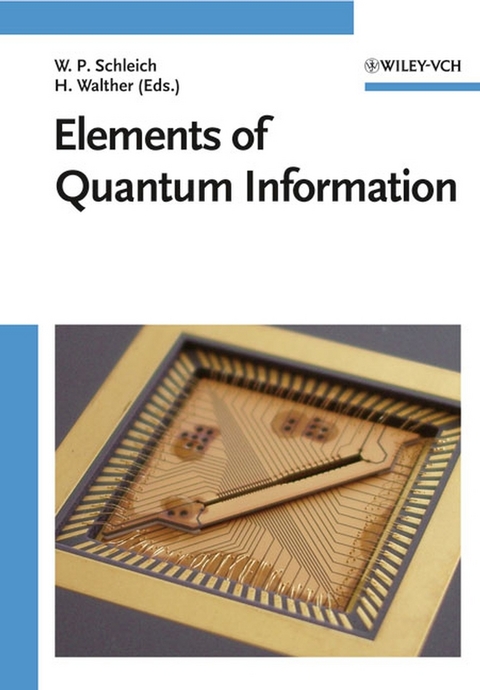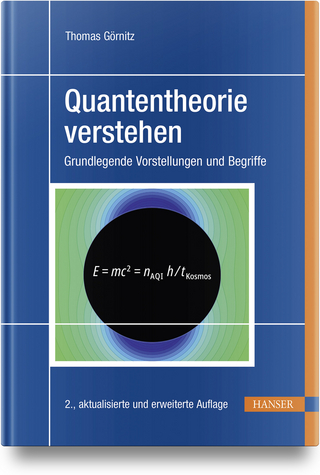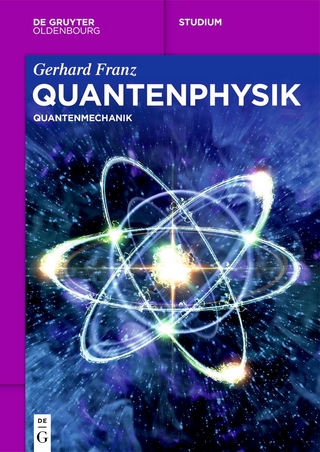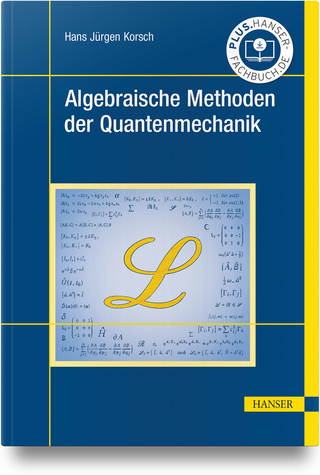Elements of Quantum Information
Wiley-VCH (Verlag)
978-3-527-40725-5 (ISBN)
- Titel ist leider vergriffen;
keine Neuauflage - Artikel merken
Wolfgang P. Schleich, born in 1957, is head of the Institute of Quantum Physics at the University of Ulm, Germany, and Adjunct Professor at the University of North Texas in Denton, USA. While working at the Universities of New Mexico, Albuquerque, of Texas at Austin and the Max Planck Institute for Quantum Physics, Garching, Germany, he has collaborated with world leaders in physics such as M.O. Scully, J.A. Wheeler and H. Walther. Professor Schleich has published more than 230 papers on problems of quantum optics, foundations of quantum mechanics and general relativity and is the author of the highly acclaimed textbook Quantum Optics in Phase Space. For his work he has received numerous awards and honors, including the Ernst Abbe Medal of the International Commission for Optics, the Gottfried Wilhelm Leibniz Prize of the German Science Foundation and the Max Planck Award. He is a Fellow of the Institute of Physics, the American Physical Society and the Optical Society of America and has been elected a member of several academies, such as the Leopoldina, the Heidelberg Academy of Science, and the Royal Danish Academy of Sciences and Letters. Herbert Walther (1935-2006) received his Ph.D. from the University of Heidelberg in 1962. After working at various universities in Germany, France and the United States, Professor Walther accepted a post as Professor of Physics at the University of Munich in 1975, from which he took retirement in 2003. From 1981, Professor Walther also worked for the Max Planck Society. He founded the Max Planck Institute of Quantum Optics in Garching, and headed the Institute as its Director until his retirement. From 1990 to 1996, he acted as the Max Planck Society's Vice President. Professor Walther was a Fellow and member of many professional physics organizations and scientific boards. He was awarded numerous honours and awards, among them the Max Born Prize (1978) and the Humboldt Medal (1998).
1. The deterministic generation of photons by cavity quantum electrodynamics (H.Walther)
2. Optimization of segmented linear Paul traps and transport of stored particles (S.Schulz et al.)
3. Transport dynamics of single ions in segmented microstructured Paul trap arrays (R.Reichle et al.)
4. Ensemble quantum computation and algorithmic cooling in optical lattices (M.Popp et al.)
5. Quantum information processing in optical lattices and magnetic microtraps (P.Treutlein et al.)
6. Two-dimensional Bose-Einstein condensates in a CO2-lasr optical lattice (G.Cennini et al.)
7. Creating and probing long-range order in atomic clouds (C.von Cube et al.)
8. Detecting neutral atoms on an atom chip (M.Wilzbach et al.)
9. High resolution Rydberg spectroscopy of ultracold rubidium atoms (A.Grabowski et al.)
10. Prospects of ultracold Rydberg gases for quantum information processing (M.Reetz-Lamour et al.)
11. Quantum state engineering with spins (A. Heidebrecht et al.)
12. Improving the purity of one- and two-qubit gates (S.Kohler and P.Hänggi)
13. How to distill entanglement from a finite amount of qubits? (S.Probst-Schendzielorz et al.)
14. Experimental quantum secret sharing (C.Schmid et al.)
15. Free space quantum key distribution: Towards a real life application (H.Weier et al.)
16. Continuous variable entanglement between frequency modes (O.Glöckl et al.)
17. Factorization of numbers with physical systems (W.Merkel et al.)
18. Quantum algorithms for number fields (D.Haase and H.Maier)
19. Implementation complexity of physical processes as a natural extension of computational complexity (D.Janzing)
20. Implementation of generalized measurements with minimal disturbance on a quantum computer (T.Decker and M.Grassl)
21. Full counting statistics of interacting electrons (D.A.Bagrets et al.)
22. Quantum limit of the Carnot engine (F.Tonner and G.Mahler)
| Erscheint lt. Verlag | 26.1.2007 |
|---|---|
| Sprache | englisch |
| Maße | 170 x 240 mm |
| Gewicht | 1115 g |
| Themenwelt | Naturwissenschaften ► Physik / Astronomie ► Quantenphysik |
| Naturwissenschaften ► Physik / Astronomie ► Theoretische Physik | |
| Schlagworte | Computer Science • Informatik • Mathematical & Computational Physics • Mathematical & Computational Physics • Mathematische Physik • Physics • Physik • Quanteninformationstheorie (QIT) • Quantenmechanik • Quantenphysik u. Feldtheorie • Quantum Physics & Field Theory • Quantum Physics & Field Theory |
| ISBN-10 | 3-527-40725-1 / 3527407251 |
| ISBN-13 | 978-3-527-40725-5 / 9783527407255 |
| Zustand | Neuware |
| Haben Sie eine Frage zum Produkt? |
aus dem Bereich




